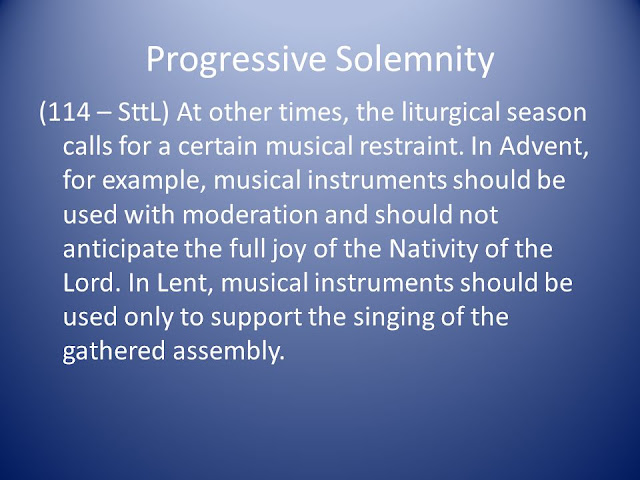In the Extraordinary Form of the Mass, there is a kind of progressive solemnity but not quite, meaning there is little flexibility in adding it or taking it away, but there are some:
1. Low Mass, nothing of the Mass is sung only spoken, but for Sundays and Holy Days of Obligation, four hymns can be added in the vernacular or Latin. That's a form of progressive solemnity.
2. In the Sung Mass, aka, High Mass, everything is chanted, meaning the Mass itself, but other anthems or hymns could be added as a processional, offertory, Communion and recessional. Incense is or isn't used. It is optional.
3. Solemn Sung Mass with priest, deacon and subdeacon is very prescribed although even there something could be added in terms of music.
4. And of course there is the Pontifical High Mass which most never attend.
In the Ordinary Form of the Mass there is all kinds of flexibility for "progressive solemnity" and no longer are the EF's terms of low, high and solemn high used.
At my parish, we chant all the parts of the Mass at all three weekend Masses. At our 10:30 AM Mass we use incense. However, we never chant to Old Testament or Epistle readings and very rarely chant the Gospel.
With the pandemic, we stopped the "presentation of the offerings".
And then today, I had a bright ideal, concerning adding solemnity to our more solemn Masses and how to do it since we have so much solemnity at our normal Masses.
1. We do chant the Gospel, rarely, but for special Solemnities. We could choose to do so for other feasts and solemnities celebrated on Sunday.
2. For really high holy days, we could have someone chant the other readings.
3. While we use incense at our principal 10:30 Sunday Mass, we seldom incense the elevations, thus that is another avenue for progressive solemnity for Feasts and Solemnities.
BUT HERE'S A NEW TWIST AND I LIKE IT!
We could have the "presentation of the offerings" only for special feasts, solemnities and sacraments, like Easter Sunday and its Vigil, Confirmation, First Holy Communion, Pentecost, Corpus Christi, etc
Brilliant if I do say so myself!

6 comments:
The OF seems to lend itself to morphing into whatever you want it to be.
I hope the day comes where the right hand side of the EF missal, the vernacular, becomes normative meaning, the EF is adopted along with its rubrics (Anglican Ordinariate style). Latin for common parts might have a fighting chance at having its intended and unifying pride of place restored should this happen. Musical accompaniment could also be enhanced.
As for the presentation of the gifts, most dislike participating, some outright refuse, it comes off as an awkward let's all smile at each other type of exchange and as its wholly symbolic (the assembly had no part in the making of the elements) why is it even needed? As the elements are prepared at the altar by the priest in both the EF/OF, why not just eliminate the symbolic procession as superficial?
As an aside, in the Byzantine Eastern Church, the prepared and blessed elements (there's a service for this prior to the start of the Divine Liturgy) are brought from the proskomedia table (the table of preparation) which is located within the holy place near to the northern deacon's door to the the royal doors by the priest(s) in procession (the great entrance), are then placed on the holy table (altar) and are incensed. My point, there's a distinct purpose to going through this action.
This is actually a common practice in Poland: No offertory procession for most Sundays but only on special occasions.
Singing the readings and/or gospel in an ordinary parish is very unwise (except perhaps for a few of the most solemn feasts such as midnight mass or the easter vigil). Apart from being exceedingly tedious, it makes comprehension of the spoken word extremely difficult to follow and comprehend). In an ordinary parish, there are other parts of the liturgy (eg preface, eucharistic prayer or communion rite) which take higher precedence for singing.
Singing the readings and/or gospel has a place in Cathedrals and maybe Basilicas - but please no, not in my parish. I really don’t think I could tolerate it!
The solemn singing of the Passion on Palm Sunday and Good Friday with Chronista, Synagoga and Christus (each singing in a different register) is very impressive, especially if the choir uses a polyphonic setting for the turba choruses. It is far from tedious. In the OF it is permissible for a layman to sing one of the parts (usually Chronista, who carries the main burden of the singing).
I have heard it in Latin and English and in neither case had any difficulty in making out the words. As a general rule priests and deacons should be able to chant their parts in Latin and the vernacular; they are relatively simple. The more complex chant is the preserve of the schola.
Are we disenchanted with re-enchantment?
The offertory procession of the laity is another novelty introduced into the Roman Rite following the Council. There is no historical evidence for any such processions by the laity anywhere in the West. It is another example of changing the liturgy to promote "active participation" of the faithful, in this case by a select (elite) little group of laity, bodily actively participating in the procession, while distracting everybody else from spiritual active participation (praying).
Post a Comment